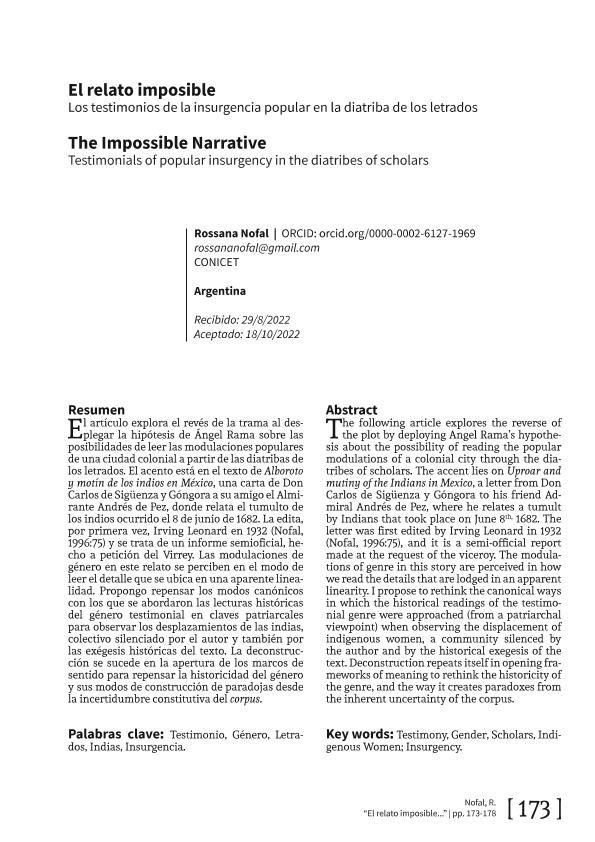Mostrar el registro sencillo del ítem
dc.contributor.author
Nofal, Silvia Rossana

dc.date.available
2023-08-01T15:25:25Z
dc.date.issued
2022-10
dc.identifier.citation
Nofal, Silvia Rossana; El relato imposible: Los testimonios de la insurgencia popular en la diatriba de los letrados; Universidad Nacional de San Juan. Facultad de Ciencias Sociales. Instituto de Investigaciones Socio-Económicas; RevIISE; 20; 20; 10-2022; 173-178
dc.identifier.issn
2250-5555
dc.identifier.uri
http://hdl.handle.net/11336/206354
dc.description.abstract
El ensayo explora el revés de la trama al desplegar la hipótesis de Ángel Rama sobre las posibilidades de leer las modulaciones populares de una ciudad colonial a partir de las diatribas de los letrados. El acento está en el texto de Albotoro y motín de los indios en México, una carta de Don Carlos de Sigüenza y Góngora a su amigo el Almirante Andrés de Pez, donde relata el tumulto de los indios ocurrido el 8 de junio de 1682. La edita, por primera vez, Irving Leonard en el año 1932 (Nofal, 1996: 75) y se trata de un informe semioficial, hecho a petición del Virrey. Las modulaciones de género en este relato se perciben en el modo de leer el detalle que se ubica en una aparente linealidad. Propongo repensar los modos canónicos con los que se abordaron las lecturas históricas del género testimonial en claves patriarcales para observar los desplazamientos de las indias, colectivo silenciado por el autor y también por las exégesis históricas del texto. La deconstrucción se sucede en la apertura de los marcos de sentido para repensar la historicidad del género y sus modos de construcción de paradojas desde la incertidumbre constitutiva del corpus.
dc.description.abstract
The following article explores the reverse of the plot by deploying Angel Rama’s hypothesis about the possibility of reading the popular modulations of a colonial city through the diatribes of scholars. The accent lies on Uproar and mutiny of the Indians in Mexico, a letter from Don Carlos de Sigüenza y Góngora to his friend Admiral Andrés de Pez, where he relates a tumult by Indians that took place on June 8th, 1682. The letter was first edited by Irving Leonard in 1932 (Nofal, 1996:75), and it is a semi-official report made at the request of the viceroy. The modula- tions of genre in this story are perceived in how we read the details that are lodged in an apparent linearity. I propose to rethink the canonical ways in which the historical readings of the testimonial genre were approached (from a patriarchal viewpoint) when observing the displacement of indigenous women, a community silenced by the author and by the historical exegesis of the text. Deconstruction repeats itself in opening frameworks of meaning to rethink the historicity of the genre, and the way it creates paradoxes from the inherent uncertainty of the corpus.
dc.format
application/pdf
dc.language.iso
spa
dc.publisher
Universidad Nacional de San Juan. Facultad de Ciencias Sociales. Instituto de Investigaciones Socio-Económicas
dc.rights
info:eu-repo/semantics/openAccess
dc.rights.uri
https://creativecommons.org/licenses/by/2.5/ar/
dc.subject
TESTIMONIO
dc.subject
LETRADOS
dc.subject
DIVERGENCIA
dc.subject
CUENTOS
dc.subject.classification
Estudios Generales de Literatura

dc.subject.classification
Lengua y Literatura

dc.subject.classification
HUMANIDADES

dc.title
El relato imposible: Los testimonios de la insurgencia popular en la diatriba de los letrados
dc.title
The impossible narrative: Testimonials of popular insurgency in the diatribes of scholars
dc.type
info:eu-repo/semantics/article
dc.type
info:ar-repo/semantics/artículo
dc.type
info:eu-repo/semantics/publishedVersion
dc.date.updated
2023-07-07T21:59:17Z
dc.journal.volume
20
dc.journal.number
20
dc.journal.pagination
173-178
dc.journal.pais
Argentina

dc.journal.ciudad
San Juan
dc.description.fil
Fil: Nofal, Silvia Rossana. Consejo Nacional de Investigaciones Científicas y Técnicas. Centro Científico Tecnológico Conicet - Tucumán. Instituto de Investigaciones sobre el Lenguaje y la Cultura. Universidad Nacional de Tucumán. Facultad de Filosofía y Letras. Cátedra de Literatura Argentina. Instituto de Investigaciones sobre el Lenguaje y la Cultura; Argentina
dc.journal.title
RevIISE
dc.relation.alternativeid
info:eu-repo/semantics/altIdentifier/url/http://www.ojs.unsj.edu.ar/index.php/reviise/article/view/874
Archivos asociados
